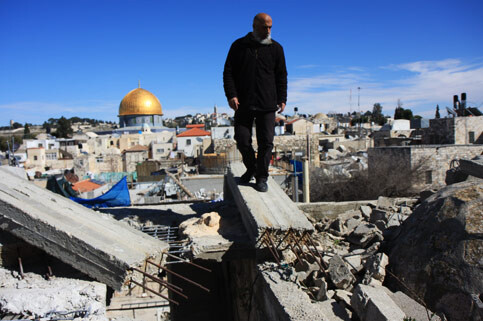The Electronic Intifada 12 February 2008

A man walks atop his home, recently destroyed by Israel in the Old City of Jerusalem, 6 February 2008. (Anne Paq/Activestills)
Recently, Israeli Prime Minister Ehud Olmert was reported to have suggested that the question of Jerusalem would be “left to last” in negotiations with the Palestinians. This was apparently on account of the issue being “too sensitive and complex,” as well as fears that talks on Jerusalem would cause the departure of religious right-wingers from Olmert’s ruling coalition.
Domestic political considerations will certainly have played a part in the prime minister’s thinking, but there is another possible motivation for leaving this “final status issue” for further down the road. In recent weeks, and indeed, going back to the December announcement of the expansion of West Bank settlement Har Homa, the Israeli government’s approach to Jerusalem has been at best contradictory, and at worst, deeply cynical.
During January there was a rash of reports — barely covered in the Western media — about Jewish construction in occupied East Jerusalem. On 23 January, it was reported Agence France-Presse that 30 percent (almost 2,500 housing units) of newly-authorized construction in Jerusalem municipality was slated for areas in occupied or illegally annexed East Jerusalem. Just last week, the Israeli daily Haaretz reported that plans were advanced for 200 Jewish homes in a “strategic location” in East Jerusalem requiring “Palestinian buildings” to “be demolished to make room.”
Another example is the new housing units in Maaleh Hazeitim, a project initially funded by the patron of ultra-nationalist Ateret Cohanim group, Irwin Moskowitz, and backed by Jerusalem mayor at the time, Ehud Olmert. Those behind the increasing construction, Haaretz reports, intend Maaleh Hazeitim to be an obstacle to creating Palestinian territorial continuity “between the West Bank to the east, and the Temple Mount.”
There is more, such as the private developments of Nof Zion and the City of David housing project, the former specifically targeted at Jewish-Americans. While not official government initiatives, Israeli architect Efrat Cohen-Bar, from the planning rights non-governmental organization Bimkom, pointed out that “all small settlements of Jews in the heart of Palestinian neighborhoods make it impossible to divide.”
Olmert’s office, meanwhile, continues to send confusing messages about official policy towards the settlements. One week, there is a much-heralded freeze on settlement expansion in the West Bank — but excluding East Jerusalem. The next week, it is a total ban, including construction in existing settlements. Then to make all of that seem academic, brand new buildings spring up in occupied East Jerusalem.
It is actually a misnomer to describe Jerusalem as being any more or less complicated than the other elements of a future agreement between Israel and the Palestinians. International law already caters to the broad territorial questions about dividing the city, and there are numerous, highly practical, solutions available for the delicate matter of sovereignty over the Old City’s holy places.
In reality, what makes it so difficult to find a solution is the cross-party consensus in the Israeli political establishment that Jerusalem is the “eternal, undivided” capital of the Jewish state. From the Knesset’s 1980 declaration to then Prime Minister Ehud Barak’s party election manifesto in 2000 and public declarations by former Prime Minister Ariel Sharon, there is complete unity around this compromise-defying policy.
Such a position can never be accepted by the Palestinians, who, for their part, are simply demanding that international law be heeded, that Israel’s post-1967 annexation and occupation should not be recognized, and that East Jerusalem becomes the sovereign capital of their independent state. Yet as any map of Jerusalem shows, successive Israeli governments of the last forty years have deliberately used settlement construction in order to encircle the unilaterally-expanded municipality and render equitable partition impossible.
Reports that Olmert is feeling the heat from the ultra-Orthodox members of his coalition may be read by some as yet another example of the deleterious effects of religious extremism. In fact, persisting in the fiction not only that Jerusalem is “eternal and undivided,” but that peace can be built on such a position, is part of the Israeli mainstream. Thus it might well be the case that leaving Jerusalem “to last” is actually an intentional move, freeing up Israel to create yet more “facts on the ground” in the meantime.
Ben White is a freelance journalist specializing in Palestine/Israel. His website is at www.benwhite.org.uk and he can be contacted directly at ben A T benwhite D O T org D O T uk.





